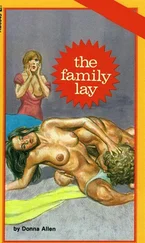If you asked Perrine (which you can’t anymore, but apparently someone did while she was still alive), she would have said that the worst part of her ordeal was not hanging by her neck from a tree and fearing that darkness without end was about to swallow her up. No, the worst part was seeing the looks on the faces of her teacher and fellow pupils as she hung there, suspended in the air. Each and every one of them believed that Perrine was doomed, and not a single one made any move to save her life. Twenty-nine pupils and one teacher stood perfectly still and watched with smiles of admiration for the murderer on their faces, happy that soon Perrine would be no more.
It was only when it became obvious that she would survive that her teacher sighed and said, “I suppose we’d better call an ambulance.”
4
I’m in the wrong place: sitting next to a tree in a terracotta pot in the lilac-walled reception area of the police station, when I should still be at Ellen’s school. I can’t believe I allowed myself to be steered out of Lesley Griffiths’s office and whooshed out of the building with a stream of encouraging but meaningless pleasantries: Ellen is a lovely girl, she’ll go far, she’s so creative . . . Yes, all true, all good to hear, but not the point.
George Donbavand is the point.
Why was I so utterly useless in the face of Lesley’s manipulation? Why did I leave without a satisfactory explanation? I know people do strange things when they’re in shock, but it isn’t as if I was tortured or assaulted—only mightily confused. It’s hard to stand up for yourself when you’re too bewildered to think straight.
Deliberately bewildered—that’s how it felt.
If there was never a boy at Beaconwood by the name of George Donbavand, why wasn’t Lesley more alarmed to hear about my daughter’s invention of him? Why would Ellen make up a sister for him, also in danger of imminent framing and expulsion?
I wish I’d asked Lesley about Fleur Donbavand. As soon as I’m finished here, I’m going to go back to school and interrogate some other people: Kendra Squires, Mr. Fisher, any children I can get my hands on. Hurry up, Police Constable Phoebe Hilton. That’s who I’ve been told I’m waiting for.
Dozens of pupils would have known George if he was at Beaconwood, and all the teachers. You can’t force that many people into a conspiracy to lie, not with someone like me pestering them, determined to find out the truth.
I keep coming back to this: Lesley Griffiths isn’t crazy. So what is she? Something much worse? If she’s lying to me—telling me there’s no George when there is one—that’s so unacceptable, I can barely believe any head teacher would do it.
No one would do it . Yes, the world is full of grotesque characters who behave appallingly, but . . . this is too outlandish, too out-and-out bonkers. I can see the headlines in the Sun and the Mail now: “Head teacher who denied existence of pupil is revealed to be . . .” What?
“Justine Merrison?” I look up to find a young woman smiling at me. “I’m PC Hilton. Call me Phoebe, though.” She doesn’t look much older than Ellen. Blond hair sprouts from the top of her head in a high ponytail.
Is it illegal for a head teacher to lie to a parent? I might ask. The mystery of George Donbavand is all I’m interested in discussing at the moment. I’m less worried about the nuisance phone calls; they’re a problem I might be able to solve without police help. If living in Devon means putting up with threats from strangers and sending my daughter to a school where pupils get “disappeared” in the manner of a fascist regime, then I have no desire to stay in the county. I don’t want to go back to London, either. Maybe the deranged lisper would accept a compromise: Somerset, or Cornwall.
I love Speedwell House, but I don’t love it that much. We could sell it in less than a week, probably—to one of the four families that lost out in the auction we won. Alex would insist that quitting is for cowards, but I’ve heard that nugget of alleged wisdom before and I’ve never agreed with it. If there’s an aspect of your life that’s making you unhappy and you can escape from it, why wait? Too many people stick around and try to improve things, which often means slogging your guts out to compensate for the deficiencies of others. Personally, I’m a fan of the discard: leave it; move on.
Or, as Ben Lourenco so memorably said the last time I spoke to him, “Chuck it in the fuck-it bucket.”
“Shall we go somewhere where we can talk in private?” Phoebe Hilton asks.
“I don’t mind. Here’s fine.”
“I think we’ll be better off in a less public place. Reception’s not usually this quiet. You never know who’ll turn up.”
“Fine.” Then why ask me? I don’t care. I want to get this over with so that I can go back to Beaconwood.
PC Hilton starts a conversation about the weather as we walk down a series of corridors. I do my best to participate without yawning. After we’ve established that it might or might not get colder over the next few days, she asks me about my accent. When I tell her I’m originally from Manchester, she says, “Whereabouts?”
“Northenden.”
“I knew it! Near me. I was born in Wythenshawe.”
“Really? You sound very Devon for a Mancunian.”
“We moved here when I was fifteen. I gave myself a quick change of voice, so as not to get the bejesus kicked out of me every day at school. Still go back to Manc, though—my nan’s been there all her life. Northenden’s posh, if you ask her. S’pose anywhere’s posh compared to Wythenshawe.”
“Apart from Miles Platting.” I smile.
Phoebe Hilton laughs. “Miles Platting! That’s a name I haven’t heard for a long time.”
“I had a boyfriend who lived there. My dad and stepmum disapproved.” And my mum called them snobs and told them to get over themselves, because Northenden was hardly Mayfair.
What would PC Hilton say if I told her my mother was killed by a family tree? She’d probably say it can’t be true.
It isn’t. I know it isn’t. It only feels true.
Family trees are nothing more than pictures on paper. Do your worst, Bascom and Sorrel Ingrey. You can’t harm me, whoever you are.
We end up in a long rectangular room with horrible pleated orange curtains, and lots of chairs and tables pushed back against the walls as if to make space for an imminent barn dance. “Grab a chair,” PC Hilton says, doing so herself. She sits down and pulls a small notebook and pen out of her pocket. “Right. Tell me about these funny phone calls, then. Funny peculiar, I mean—not funny ha-ha.”
I start by describing my anonymous caller’s sort-of lisp, then do my best to reconstruct both conversations in their entirety. Next I explain the oddest part: that this woman talks as if we know each other well and have a history together when we don’t. “I wouldn’t be here, except when I called my husband and told him about it, he insisted I tell the police.”
“He’s right. If you’ve been threatened, it’s always best to report it. Even if it’s all hot air, as it seems in this case.”
“You mean—”
“It’s unlikely this person will do you any physical harm.” Phoebe Hilton looks up from her note taking and smiles.
“What makes you say that?”
“Well, most antagonistic anonymous callers get all the aggro out of their systems by making the calls. That’s enough for them.”
I wait for her to produce something more persuasive. When she doesn’t, I say, “Most?”
“Yes. Admittedly, a small minority do take it further, but there are usually very specific warning signs—things we look out for. I’m comfortable that none of those red flags are cropping up here.”
Читать дальше











